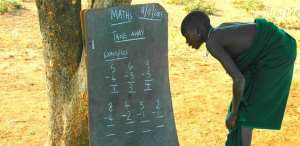
Centuries after exploitation by colonial masters, the continent of Africa still faces many challenges in providing quality education, a good source of drinking water and proper health facilities.
With the highest population, Africa has the highest rate of illiteracy with about 757 million adults and 115 million young people, who do not have the basic skills to read and write, according to UNESCO.
Exploitation, underdevelopment, the high cost of living, poverty, lack of employment, illiteracy, and corruption, have forced Africans to flee the continent in search of greener pastures in foreign countries.
For some time, Italy has been calling for solidarity in Europe, to share the burden of immigration. The request, unsuccessfully, is motivated by shared interests in the face of violence and poverty in Africa.
In fact, the exodus across the Mediterranean, as said earlier, is not only the result of the current political chaos and violence in many African countries.
It is a consequence of the greatest crime in human history, a crime perpetrated by the US government, Britain, France, Holland, and Belgium, and now followed by China.
There is no word which can describe the condition of Africans than a tragedy.
The incessant raid of resources, human, mining, agricultural, began in the fifteenth century, when the Portuguese mapped coasts and developed business, then followed by Spain, England, and France.
The consequences of illiteracy are many and varied, and seriously affect the daily lives of Africans, who have very little chance of finding a job and earning enough to ensure a dignified existence.
At the same time, the lack of education prevents people from finding out about many other problems that afflict the country, especially, the role foreign governments play to retard the economic and developmental progress of the continent.
Many Africans are deeply affected by illiteracy to the extent that some believe Aids and Ebola were spiritual diseases invoke by God to punish Africans, without a slight knowledge that they are biological weapons by the US government to reduce Africa's population and to take control over our rich resources.
I was miserable the whole day when a man I knew in Belgium, not in Africa, for almost two decades told me "Hmmm! Aids oye sumsum yeriba"- Aids is a spiritual sickness.
I couldn't understand the reason this man came to Europe when many uneducated Africans are intelligent. I didn't bother to explain anything to this moron. There are some heads one can't help because this man is in his late fifties.
A family made up of illiteracy has little chance of having their children study, which in turn will not have the chance to secure a future and guarantee to the children. This is how the chain of poverty extends.
The situation is particularly serious in sub-Saharan Africa which concentrates 30 of the 58 million uneducated children.
The most affected regions are those of western and central Africa with 18.8 million. Proportionally this means that 31% of girls and 23% of children do not go to school, an average of about 25%, compared to 4% in Western Europe.
Among the twenty countries in the world with the highest rate of non-schooling children in elementary school, 17 are in sub-Saharan Africa. Eritrea leads by 66%, Liberia and South Sudan 59%, Sudan 49% and Djibouti 42%.
Inequality and poverty can be reduced if African leaders invest more in education. Already some governments, including Rwanda and Ghana have started, with Ghana introducing a free education.




 Supreme court declares payment of wages to spouses of President, Vice President ...
Supreme court declares payment of wages to spouses of President, Vice President ...
 Publish full KPMG report on SML-GRA contract – Bright Simons to Akufo-Addo
Publish full KPMG report on SML-GRA contract – Bright Simons to Akufo-Addo
 Kumasi International Airport to begin full operations by end of June
Kumasi International Airport to begin full operations by end of June
 Election 2024: Our ‘real challenge’ is getting ‘un-bothered’ youth to vote – Abu...
Election 2024: Our ‘real challenge’ is getting ‘un-bothered’ youth to vote – Abu...
 [Full text] Findings and recommendations by KPMG on SML-GRA contract
[Full text] Findings and recommendations by KPMG on SML-GRA contract
 Renegotiate SML contract – Akufo-Addo to GRA, Finance Ministry
Renegotiate SML contract – Akufo-Addo to GRA, Finance Ministry
 J.B Danquah-Adu murder trial: Sexy Dondon to Subpoena Ken Agyapong, Ursula Owusu
J.B Danquah-Adu murder trial: Sexy Dondon to Subpoena Ken Agyapong, Ursula Owusu
 Galamsey: Five Burkinabes jailed 20 years each for mining
Galamsey: Five Burkinabes jailed 20 years each for mining
 'It's no crime' – Abu Sakara defends Alan's exit from NPP
'It's no crime' – Abu Sakara defends Alan's exit from NPP
 'We know all your houses, pay your bills now or we’ll disconnect you; we're all ...
'We know all your houses, pay your bills now or we’ll disconnect you; we're all ...
